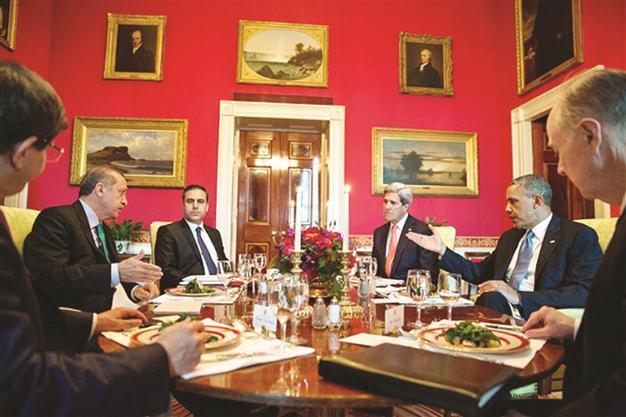Is Turkish intelligence or PM Erdoğan in question?

PM Erdoğan (2L) MİT chief Hakan Fidan (3L) and FM Davutoğlu (L) hold talks with US President Obama (2R), his advisor Dillon (R), and Secretary of State Kerry. Courtesy of the White House
An article published by The Wall Street Journal on Oct. 9 about Turkey’s Intelligence Chief and his Syria (and generally Middle East) line, which irritates the U.S. administration, has upset Ankara, according to Turkish intelligence sources talking to the Hürriyet Daily News, asking to remain anonymous.The article, bylined by Adam Entous and Joe Parkinson, was titled “Turkey’s Spymaster Plots Own Course on Syria,” and subtitled that the head of Turkey’s National Intelligence Organization (MİT), Hakan Fidan, “takes and independent tack in wake of Arab Spring.”
“It is, of course, national and it cannot be expected to be the same as any other country, including our allies,” a source told the HDN. “But I assure you that our cooperation regarding Syria theater with our American colleagues has further increased since the meeting with the White House that is mentioned in the article.” My source declined to give any details about the “field cooperation” for “operational reasons,” but gave an example of the changing tone in the political scene.
According to this source, in the Istanbul meeting of the Syrian National Coalition (SNC) on May 23, which came one week after Turkish Prime Minister Tayyip Erdoğan’s meeting with U.S. President Barack Obama in the White House on May 16, Turkey made it possible to place “all the names proposed by the U.S., the U.K. and Saudi Arabia” on the decision making body of the SNC. Right after that on June 6, the Saudi-backed Ahmad Asi al-Jarba was elected as the new head of the organization, which is supposed to act as a political umbrella for groups opposing the Bashar al-Assad regime in Syria.
The key claim in the WSJ article is that Turkey is in favor of sending weapons to the Syrian opposition without any discrimination, despite warnings by Americans that they may end up in hands that are fighting against Western interests. The article says that such traffic has considerably decreased in 2013, possibly following the May 16 meeting, but the fact that the radical al-Nusra Front is now considered a part of al-Qaeda is shown as evidence for this claim. Hakan Fidan, who is described by Erdoğan as being his “black box,” was held responsible of this policy.
Actually, the portrait drawn in the article describes Fidan as being “number two” in the country, and being “much more powerful than President Abdullah Gül” do not exactly reflect the truth. Not only in Ankara, but everyone in Washington who is observing Ankara knows clearly who is forming policy in Turkey. Prime Minister Erdoğan is indeed in control of the government policies and, as a loyal bureaucrat of Erdoğan, to follow a different line for Fidan does not seem possible. Fidan has indeed “shifted the agency’s focus to match Erdogan’s,” as stated in the WSJ article.
On the other hand, this is not the first time that Fidan has been under fire from outside. Firstly, when he used to be the nuclear sherpa of Turkey during the Iran-U.N. talks in 2009, and secondly after being appointed as the head of the MİT, Fidan faced - mostly Israel-originated - claims that he may have shared intelligence collected by the U.S. and Israel with Iran. These claims were categorically denied by Turkish officials.
It is possible to read the WSJ article as expressing the U.S. administration’s uneasiness with Fidan, who actually accompanied Erdoğan and Foreign Minister Ahmet Davutoğlu during a lunch in White House where Syria was heavily discussed on May 16. But that would not give a full idea about what is really going on.
To read it as informal and indirect could be more realistic, this time the public message to Erdoğan from the Obama administration by targeting the man in his confidence. It appears that Obama, who is close to a deal with Russian President Vladimir Putin on the way to the Geneva II talks on Syria, doesn’t want to see any last minute surprises from Erdoğan, who doesn’t want to even discuss al-Assad keeping his position. Plus, by extending criticism of the leaked information to the Erdoğan government’s sympathy for the Muslim Brotherhood across the region, perhaps Washington DC would like to see Erdoğan acknowledging the fact that the season of supporting moderate Islam might soon be over.











